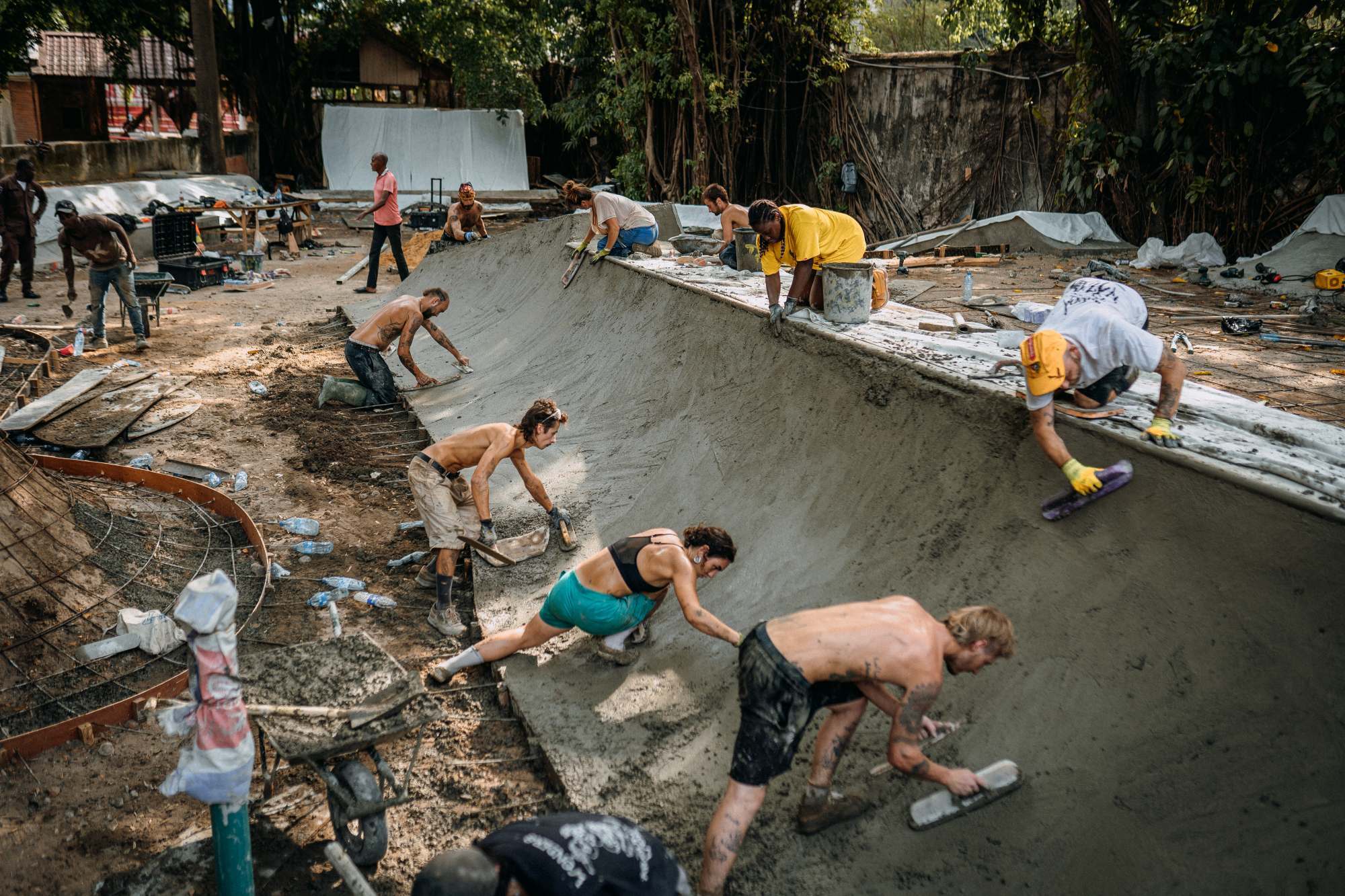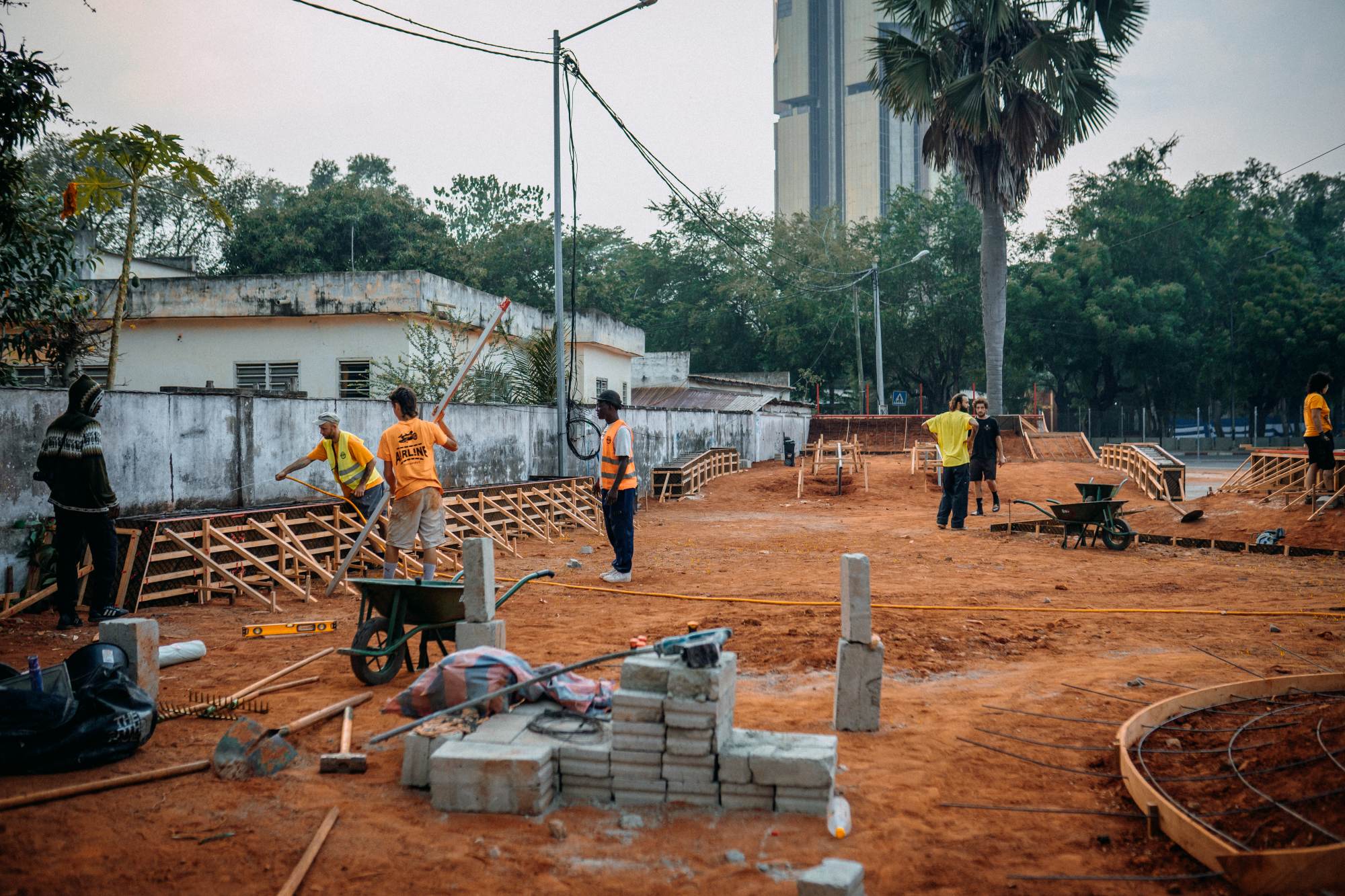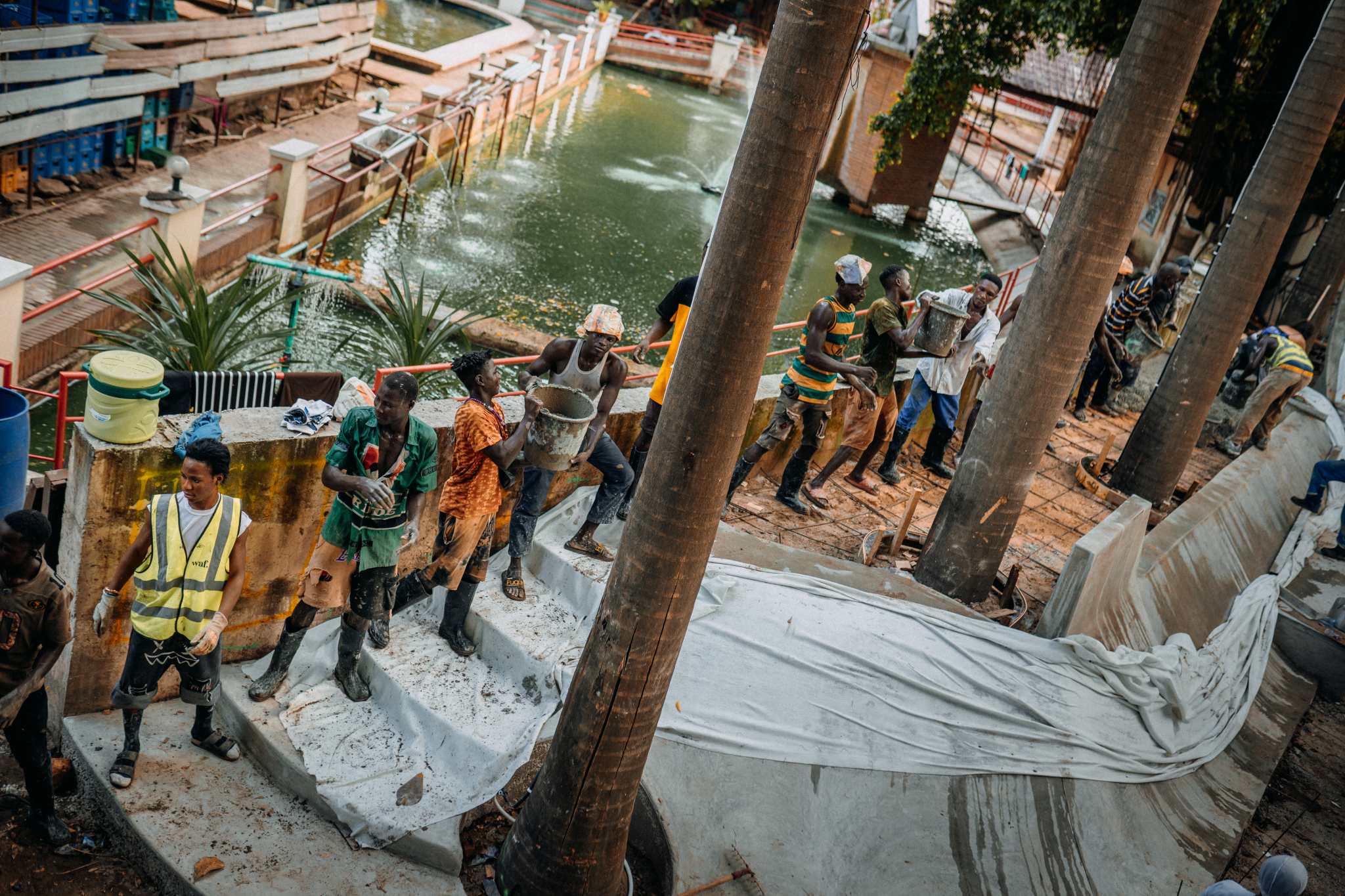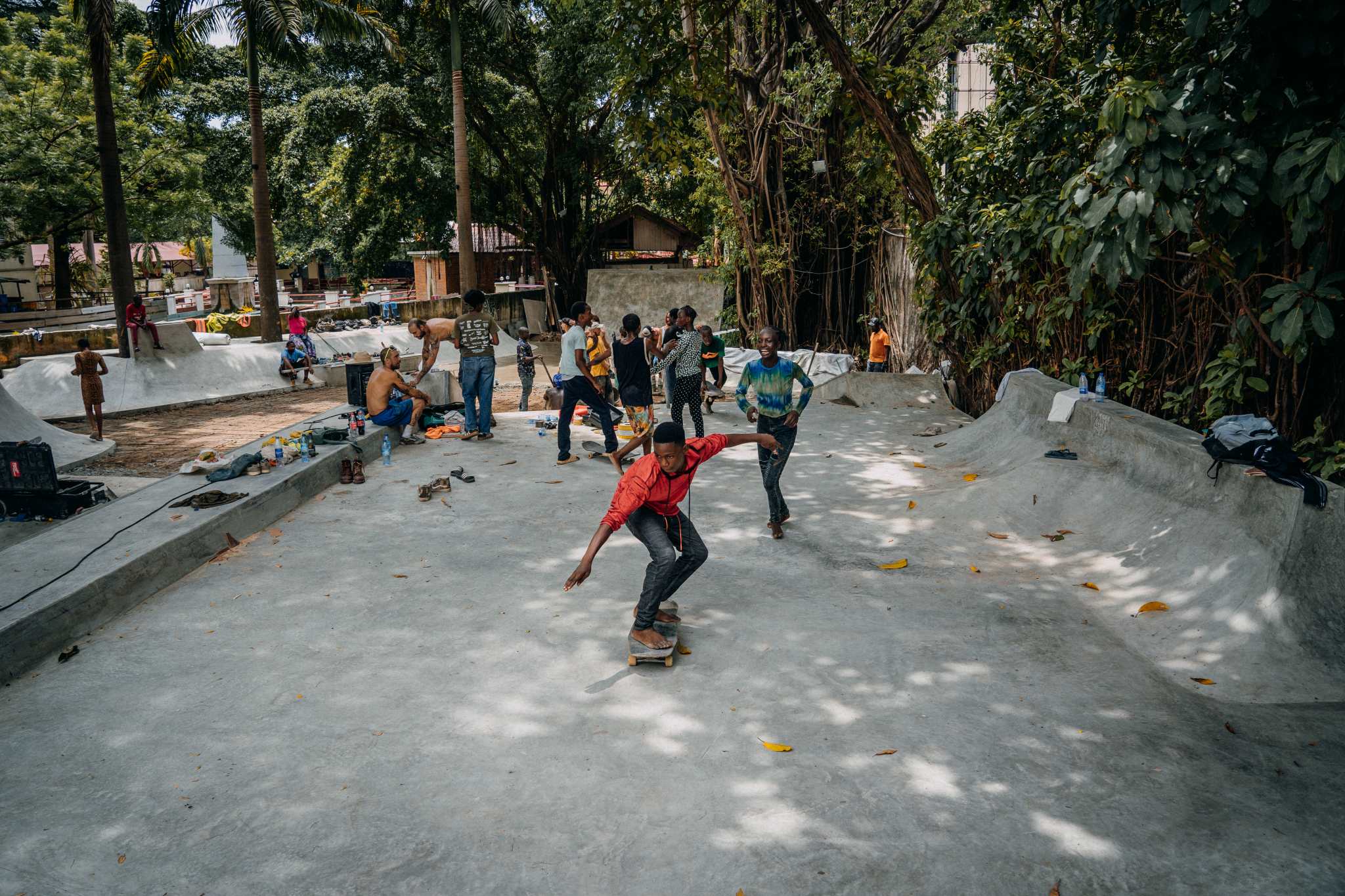In Conversation with Léo Poulet, Jomi Bello and Philipp Preysing
Wonders Around the World is an international non-profit organization building skateparks in developing countries across the planet. With around 20 volunteer-led constructions under its belt - including in Bangladesh, Ecuador, Jordan and Mexico - it is leading the change within underprivileged communities and broadening the positive impact of skateboarding. Now, WAW is celebrating its biggest undertaking yet, having built two new skate facilities, back-to-back, in West Africa. THE SKATEROOM has proudly supported these projects with funding, continuing our long-lasting partnership with Wonders Around The World and its executive director Léo Poulet.
First up is the small country of Togo and its oceanside capital Lomé. The local skate community was growing in numbers but severely lacking in facilities, forcing skaters to organize independently, meander between urban locations and face bans and rejections. After speaking to the local community, Philipp Preysing, together with skaters from Skate Union Togo, realized the urgent need of creating a dedicated, open space for young people to congregate, while also fostering a safe learning environment for new generations of skaters. In February, the brand new skatepark had opened its doors, serving as Togo’s first free-entry recreational space and cultural hub.

From Lomé we take a six-hour bus ride to Lagos, the bustling capital of Nigeria. Here, the skate community has been growing exponentially, spearheaded by Jomi Bello - the founder of Waffles and Cream. waf., for short, is a skate brand, a movement and a window to the world for those feeling trapped in traditional career paths, mainstream sports and generational expectations. Bello envisioned an ecosystem in which skate, art and commerce can go hand in hand, responding creatively to the needs of the community and representing Nigerian culture. The newly opened first local skatepark is a further manifestation of this vision. Built under a canopy of trees, on the site of a former colonial prison, the construction is rewriting history, honoring the past and paving the way for a brighter future.
Three worlds meet in this exclusive conversation with THE SKATEROOM.
For starters - Léo, could you tell us a bit about Wonders Around The World, the overarching agent connecting these two undertakings?
Léo Poulet: Our main focus is building skateparks in countries which don’t have any. Giving access to skating to kids who don’t have this opportunity. We have existed for five years, and have made around twenty projects in developing countries.
How did you identify Lagos and Lomé as the next two destinations?
Léo: When it comes to Lomé, I received an email directly from Philipp (Preysing) asking about how we could build a skatepark together. I think it was about two years ago and since then we kept in touch regularly. It’s actually a great example of how to make a project like this happen. It’s about continuously having conversations, asking questions and coming to realizations.
I’ve been connected with Jomi (Bello) by a friend who presented to us this project in Lagos. He had a file on his computer with pictures and videos of the land – he had already done a little DIY on an island near Lagos and he showed us all this footage and designs he made. Jomi and the architect have already done 50% of the job, in terms of design and finding sponsorships. We just decided to jump in.
Jomi, you are the founder of Waffles and Cream (waf.), a skate brand which is shaping creative culture in Nigeria. Now you’ve built a skatepark. What a journey.
Jomi Bello: The idea of the skatepark was in correlation with how I started the brand, about sixteen years ago. It started with me. Growing up as a teenager, you may think there’s something wrong with you if you don’t like football. In West Africa it’s like a cardinal sin for a young man not to enjoy football. I didn’t. And so… you know how your parents give you a lot of things to try, to see which one you gravitate towards? My mom just threw a skateboard at me.
At the time there was no good access to the internet in Nigeria, so I didn’t have a reference of what a skateboard did. But then, when I was sixteen, I moved to Leeds and at my break time I stumbled across a skatepark. I remember being so fascinated that I stayed the whole day and started making friends. I was the only Black kid there. For the first two weeks, all I did was just watch and hang out with skaters all day. I thought – I cannot be the only person in Nigeria to experience this. I wasn’t doing too well at school so I needed to find something to love. I came back to Nigeria and, since then, I’ve just been meeting different artists and skaters. I was picking people up from school and taking them to skate. Here, everybody wants you to do secure jobs like lawyer, doctor, engineer – and there I was trying to push skateboarding.

How did that go?
Jomi: The luckiest thing for me was doing a lot of activations – exhibitions, screenings, yoga (for all the skaters in pain). The fashion community here also loved us because it was the first time they saw something which reflected Nigerian culture. When we were designing the clothes, we were also trying to represent ourselves. We understand skating as a Western thing, but how does it look through our lens?
In Africa, we don’t really celebrate pros because skateboarding is still in its infancy. But there are community leaders who are really good at skating. The standard is different. We are in control of our narrative. We’ve identified the key people and now they skate and contribute to the culture through different media. Because I sucked at school, I was interested in how careers can be built around skateboarding. You can contribute to skate culture and you don’t have to get a regular job to support it. You can just do the whole nine yards – whether you’re a photographer, stylist or an after-school program organizer. I want to build a whole ecosystem so that my little sixteen year old self doesn’t have to have the anxiety of what do I want to do with my life, because I’m stuck between nation building jobs. That generation is passed now.
Was a skatepark always the goal?
Jomi: The skatepark was actually the beginning of the dream. I wasn’t thinking then of this whole ecosystem around it. I just wanted a skatepark. But because I couldn’t get a skatepark, I couldn’t get funding, I couldn’t find land – I had to develop everything else to get there instead of waiting for other people. I think the addition of the skatepark will impact our whole community tremendously by creating a whole new economic system for us. A competition system, a meeting ground… I’m very excited to see what it will unleash.
Was the experience in Togo similar for you, Philipp?
Philipp Preysing: It’s very close to the lines that Jomi was drawing right now. It’s a very young skate community, the first skateboard came to Togo probably less than ten years ago. As it always happens, skateboarding brings out the best in people – having to rise up to that unusual physical challenge that is first of all your own, but also shared with everyone else around you. And so, the local guys that skated had formed a community – Skate Union Togo. Everybody contributes and there are no restrictions – photography, film, music, clothing design. Many also enjoy teaching skateboarding to very young skate enthusiasts.
I love how Jomi put it – the skatepark is the shared dream and, while we couldn’t do it at first because of Covid and because money isn’t lying on the street waiting for us, we organized in other ways. Taught kids how to skate, launched workshops and art projects and created a place which we called home. Everyone developed their skills and now it seems that it’s all coming together at this skatepark.
In the process of preparing for this build, you have spoken a lot to the local community. What have you learned through these conversations and how did it impact the design and plans for the park?
Philipp: The skaters had to move all the time and didn’t have a designated space. There were rollerbladers in one place and a trade fair at the other, so they were always being moved out. For skateboarders, it is not technically such a big problem, but because they had a crowd of kids who were following them around and wanting to learn, we realized that we needed one place that is really designated for these activities and suitable for the kids. Once we agreed on that, then came the design – Léo and Wade Trevean did a wonderful job there. We had only a very unusually shaped piece of land available for the skatepark. It was not extremely convenient but they did a fantastic design on it. The skaters come from a flat environment so the only thing that they really wanted was slopes and a flow to follow. This has been picked up nicely by WAW.

How was it in the case of the Lagos skatepark design?
Jomi: The land is an interesting place. It used to be Her Majesty’s prison in Nigeria’s colonial times. The ground where we’ve built the skatepark was where the prisoners were protesting because they were ill treated. They broke down the walls and bricks had to be shipped in from England to rebuild it. Now, trees have taken over the wall so we couldn’t build against it. Instead, we had to build concrete retaining walls around the whole place. It wasn’t a great space but now we’re one of the key people to regentrify and regenerate it. The location is also where the prisoners used to shower, so there were marks of that on the floor. When we were designing the skatepark, it was one of our mandates to put some of that history back into the park. Illustrations, a little bit of sculpturing, trying to find those marks for where the showers were… that’s an interesting historical feature of the design. It’s also in a canopy of trees, which is nice because Lagos gets very hot and the trees protect from direct sunlight. It’s like skating in an oasis in the forest.
I’d like to discuss the aspect of inclusion and engagement. waf. has a history of campaigning for the inclusion of female skaters, youths and those of varied socio-economic backgrounds. How do you ensure that the skatepark is a place that’s open to everyone?
Jomi: When I was starting my skate journey in Leeds, there were different programmes. We had theme nights, time slots, different age groups etc. At the time, I didn’t understand why girls had a Girls Night Skating, but the boys never had a Boys Night Skating. Then speaking to the girls I realized that skating with boys can be a brash environment. So I want to do a Girls Skate initiative. Skating really changed my life and I believe it has the power to change other people’s lives regardless of gender, disability and socio-economic background. The resilience it builds has helped me in all aspects of life, even business. It’s not really about the tricks, it’s about the attitude. Not giving up and knowing that your tribe is behind you. I want to make sure that everyone is included in this.

Philipp, what are you envisioning for the Togo skatepark in terms of inclusion?
Philipp: We’re starting a skate school which is getting very well organized right now. They’ve been scheduling the whole year with initiatives including Women Skate Days and Vacation Skating for school kids. As a collaboration with a basketball focused NGO, we will organize an exchange in which basketballers can skate and skaters can play basketball. We’re not Nigeria – Togo is a very small place, and the skatepark is the only place in the country that’s dedicated to young children, so it has a massive attraction for any local youth organizations. The biggest focus is children, youth and girls skating.
Do you have a team of volunteers or employees on the ground at all times to manage the skateparks and keep up their momentum?
Philipp: We’re collaborating with the Ministry of Sports on this because it’s their land and we are committed to running it, keeping it active and ensuring that it’s free-access. It’s a key component which does not exist elsewhere in Togo. You have to pay for playgrounds, sports pitches – everything. There is no free access to anything except the beach. The skatepark is the first professionally built facility which people don’t have to pay money to go to. This is why we want Skate Union Togo to be so involved and maintain their responsible role in this. To make sure that it stays available to all and that there is equipment available for everyone who wants to use it. There is a great team of managing volunteers in their mid-20s. They are organizing the activities in the afternoons after 4pm when the weather is a bit cooler.
Jomi: We’re setting up an NGO but, at the same time, I believe in commerce. I don’t believe in asking too much for help. I believe in asking for help in the beginning, but as you grow into different stages it’s about – how can we figure out an ecosystem and structure that works for us? Even if we’re not going to be for profit, I really believe that people should be paid for their work, so we want to see if we can get sponsorships, advertising and competitions in the space. I really want us to be self-sufficient at some point so that we can build other skateparks based on how much value we’ve presented in our city.
Our end goal is to be an educational system. Growing up here, and this also goes for most of West Africa, there are certain sports which were introduced that I didn’t really gravitate towards. Basketball, football, table tennis… all these sports exist in an educational system. And I noticed that some schools in Scandinavia have started adding skateboarding into their curriculums. It’s something I am very passionate about as well. Making sure that skateboarding is just like football – not in terms of size, but that the discipline is educational and recognized within school systems.
Philipp: We’re lucky in this regard because Lomé is so small. The five schools we have are lining up to have classes channeled through the park, in order to allow students an hour a week to experience skateboarding.
With the builds being now completed, what is the atmosphere within the local community? Is there excitement or some hesitancy perhaps from those unfamiliar with the sport?
Philipp: The Ministry of Sports is very much excited and activated. Two years ago a skateboard was as alien item to them, as a rock from Mars. When I showed it to them for the first time they had no idea what I was doing, but when we established that it’s an olympic discipline and I presented a plan, that raised the attention. Youth organizations and schools are very excited as well. The skatepark is drawing a lot of attention now that it’s open. It’s a safe and fun place for everybody.
Jomi: We’re really excited, the local community is excited. We’ve been saying we’re going to build one for two years, trying to raise money like three times. I think people were always excited but it’s almost like they didn’t believe it would happen, because they’ve been waiting for so long. It’s surreal. I would’ve never thought that an idea I had at sixteen could one day be in front of me.

All thanks to your mom giving you a skateboard. Full circle.
Jomi: It’s all thanks to her. I find it really funny. She went from – concentrate on school, stop skating so much to being so excited and showing me things about skateboarding everyday. It’s nice. Thank god for skateboarding because I really don’t know what I would be doing.
Philipp: See, I quit skateboarding 30 years ago and then I came to Togo and I saw people skate and I really wanted to try again. So I bought a skateboard and I joined the group.
Jomi: Philipp, we’re still skating, we’re just skating in a different way. I always say that I skate everyday. I might not physically skate but I’m still keeping that mindset.
Philipp: It’s true. You never really stop.
So also a personal journey for both of you with these projects...
Philipp: Very much so. Many injuries but mainly It is quite special to witness how this sport has such a uniting spirit.
Léo, having organized so many skatepark builds in the past, could you tell us a bit about what makes this specific project so special?
Léo: It’s the first time that Wonders did two projects back-to-back. Two in a row, in two months and a half, with a team of ten to fifteen people. We travelled by bus from one project to another – luckily, it’s only a six hour drive between Lomé **and Lagos. We decided that making these two projects back-to-back would be more financially resourceful as it could save us a lot of money. It was also better for the environment as we were reducing flights.
For us, it was a very huge challenge to keep building for two months and a half as we’ve never done this before. It required big amounts of preparation. We’re 100% volunteer-led so things can often get rough on the organization front, with flights, administrative work etc. This was the first time we had enough time to prepare everything in advance. We covered all travel and insurance costs for the volunteers and made 45 visas in total because we had to go to Togo, cross Benin and then arrive in Nigeria. Because of the donations from THE SKATEROOM and other donors, we were able to make this process as efficient as possible.

To round off, what are your hopes for this first year of the skateparks?
Léo: Recently we’ve had a little problem in Ghana on a skatepark we’ve recently built. It’s being closed for a rebuild after a year of activity. This is definitely something that I’m very scared of. I know in West Africa things can change very fast and we don’t always have the control. But I’m very confident with Jomi, Philipp and the associations that we have that we can make these skateparks sustainable and long lasting. For me, what is most important is making sure that they stay open and free of charge for everyone.
Jomi: I’ve been organizing with Léo everyday, moving forward, one step ahead, brick by brick until this point. I’ve stopped the rest of my projects for waf. to just concentrate and consolidate on this. We have one shot and we can’t fuck it up.
Philipp: Couldn’t agree more. We had a Whatsapp group that was going off every minute. The entire crew was working like mad to get this off the ground. To see it completed is the wildest dream of all. Putting it out there, in concrete, was what we were aiming for. Now that that is done, we can talk about the rest. The future is bright now that the concrete is dry.
Jomi: The future is now that the concrete is dry… I like that.

